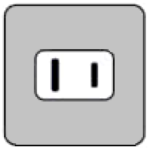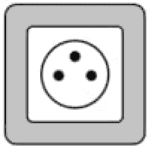Plug For French Polynesia: What You Need To Know
What is the plug for French Polynesia? Before you travel, check the information below to make sure your electronic devices are compatible with the outlet type and voltage.
Electrical Summary
French Polynesia uses outlet types A, B, E at a voltage of 110/220V and a frequency of 50 Hz.
Plug Compatibility: Type A, Type B, Type E
Voltage: 110/220V
Frequency: 50 Hz
Type A

Type B

Type E

Can North Americans use Electronics in French Polynesia without an Adapter?
No! North Americans may need an adapter for the outlets when traveling to French Polynesia. North Americans device plugs will not work with all outlet types in French Polynesia. The voltage in French Polynesia may also be different from North America.
Can Europeans use Electronics in French Polynesia without an adapter?
No! Most Europeans may need a travel adapter when traveling to French Polynesia. Most device plugs will not work with the outlet types in French Polynesia. Also, a transformer is required as the voltage in French Polynesia may be different different than in Europe.
What Outlet does French Polynesia Use?
Type A

Type B

Type A plug sockets have two flat pins and no grounding pin. These plugs are typically used with devices that have a voltage of 110-120V.
Type B plug sockets have two round pins and a grounding pin. These plugs are typically used with devices that have a voltage of 110-120V.
Type E

Type E plug sockets have two round pins and a grounding pin. These plugs are typically used with devices that have a voltage of 230V.
Is it safe to drink water in French Polynesia?
To be on the safe side, you can use common precautions such as boiling tap water for at least one minute, using water purification tablets, or drinking bottled water. It’s also important to note that ice may be made from tap water and that foods may be washed or prepared with tap water.
We recommend always packing a filtered water bottle when traveling:
Travel Essentials
Be sure to check our list of travel essentials before your trip!
Should I get travel insurance when traveling to French Polynesia?
It is generally recommended to get travel insurance when traveling to a different country. Travel insurance can provide financial protection and peace of mind in case of unexpected events, such as medical emergencies, trip cancellations, lost or stolen baggage, or other travel-related mishaps.
Travel insurance can cover various expenses related to your trip, such as medical expenses, emergency medical transportation, trip cancellation or interruption, lost or stolen baggage or personal belongings, and other travel-related expenses.
Before purchasing travel insurance, it’s important to carefully review the policy details, including the coverage limits, exclusions, and any applicable deductibles or copays. You should also make sure that the policy covers any activities or destinations that you plan to participate in or visit during your trip.
Travel Summary
One of the main attractions of French Polynesia is its natural beauty, with pristine beaches and coral reefs that offer excellent snorkeling and diving opportunities. Visitors can also explore the islands’ lush forests and waterfalls, hike to scenic viewpoints, or simply relax on the beach with a tropical cocktail in hand.
The country also has a rich cultural heritage, with a blend of French and Polynesian influences. Visitors can learn about traditional Polynesian culture, watch traditional dance performances, and visit ancient archaeological sites.
French Polynesia is also known for its luxury resorts, offering overwater bungalows and high-end amenities for those looking for a luxurious vacation. Visitors can enjoy gourmet dining, spa treatments, and a range of water sports and other activities.
Travelers to French Polynesia should be aware of the potential risks of natural disasters such as cyclones and earthquakes, as well as the need to protect the fragile ecosystems of the islands. Visitors should also be respectful of local culture and traditions, such as wearing modest clothing when visiting traditional villages.
Overall, French Polynesia offers a unique and unforgettable travel experience, with breathtaking natural beauty, rich culture, and luxurious amenities. It is an ideal destination for those seeking a tropical paradise with a blend of adventure and relaxation.
Traveling to another country? Check out our Countries page for more info.
Type G